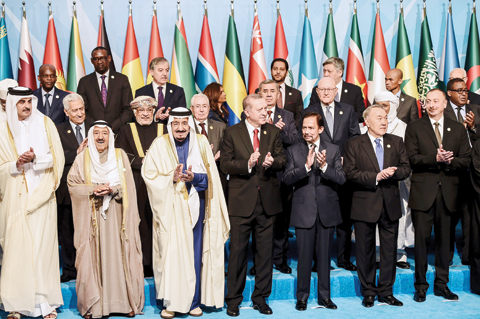 ISTANBUL: (From left) Qatar’s Emir Hamad Bin Khalifa Al-Thani, Amir of Kuwait Sheikh Sabah Al-Ahmad Al-Jaber Al-Sabah, King Salman bin Abdulaziz Al Saud of Saudi Arabia, Turkish President Recep Tayyip Erdogan, Brunei’s sultan Hassanal Bolkiah, Kazakhstan’s President Nursultan Nazarbayev and Azerbaijani President Ilham Aliyev pose for a family photo after the 13th Organization of Islamic Cooperation (OIC) Summit at Istanbul Congress Center (ICC) on April 14, 2016. – AFP
ISTANBUL: (From left) Qatar’s Emir Hamad Bin Khalifa Al-Thani, Amir of Kuwait Sheikh Sabah Al-Ahmad Al-Jaber Al-Sabah, King Salman bin Abdulaziz Al Saud of Saudi Arabia, Turkish President Recep Tayyip Erdogan, Brunei’s sultan Hassanal Bolkiah, Kazakhstan’s President Nursultan Nazarbayev and Azerbaijani President Ilham Aliyev pose for a family photo after the 13th Organization of Islamic Cooperation (OIC) Summit at Istanbul Congress Center (ICC) on April 14, 2016. – AFPISTANBUL: His Highness the Amir Sheikh Sabah Al-Ahmad Al-Jaber Al-Sabah yesterday addressed the 13th summit session of the Organization of Islamic Cooperation Summit, affirming that the battle against terrorism will be a long one but would be pursued with unwavering resolve. "Our battle against terrorism is a hard and lone one, however it will be pursued with resolve," His Highness stated at the opening of the OIC Summit, affirming Kuwait stand alongside the international community in the combat against the global menace.
"Our rejection of extremism and violence is emphatic; a priority that tops other priorities," His Highness emphasized in his speech at the 13th Islamic summit, held in the ancient Turkish city, Istanbul. He called for defending Islam against multiple attacks and tarnishing campaigns, noting that a lot of terrorist acts have been committed in the name of the heavenly religion. "Discords have been triggered at pretext of defending Islam, acts of annihilation have demolished our societies, killed our sons and the innocent on the face of the earth," Sheikh Sabah said in his defense of the religion that has been used by terrorists as a camouflage for their horrific acts that wreaked havoc in peaceful communities and caused wide-scale damage and destruction.
His Highness urged other Islamic leaders attending the top-level conference to join hands to correct the misconceptions and clear up "the image of our tolerant sharia, so that we may present to the world the bright face of sharia that is based on tolerance, acceptance and respect of human rights." "We, my brothers, are responsible for shouldering the legitimate, humane and moralistic responsibility as stipulated by our sacred religion, our conscience and belonging to this tolerant sharia," he stated.
His Highness began his address by noting that the 13th Islamic summit is held in shadow of delicate and dangerous political and security circumstances, as well as "deterioration of our conditions at various levels - hoping that deliberations at the summit would lead to mapping out a new strategy. A strategy that unifies our ranks, cements our states against challenges," His Highness said.
He warned of conspiracies aimed at fomenting hateful sectarianism. "We urge all to boost patriotism, shun any practice laced with sectarianism and to dedicate the soul of societies for unity," His Highness the Amir said adding that Kuwait supports the stability of Iraq. "Kuwait had provided a lot of humanitarian aid - the latest is the two million dollars to Iraq and has agreed to delay payment - the last installment of (war) compensation, considering the circumstances experienced by our Iraqi brothers," he said. He expressed hope that the Iraqis would pursue (with success) the political process and reforms.
On Syria, he expressed hope that the reconciliation efforts would be crowned with success. "We urge the rival parties not to miss this opportunity. We urge them to place their homeland's interests above all priorities and halt the bloodshed." Regarding Yemen, His Highness hoped the recently declared cease-fire would pave way for the upcoming peace talks, due in Kuwait on April 18th. On Libya, Sheikh Sabah Al-Ahmad welcomed the step by the national reconciliation government as it starts its work in line with Al-Sukhairat accord, signed in December 2015.
Turning to the Middle East question, he noted that Israel's intransigence is hampering international efforts and wasting "the chances to reach a final settlement" to the conflict. He called on the Security Council to mount pressure on Israel to accept relevant UN resolutions and the Arab peace initiative, regretting noticeable dwindling interest in the peace process, thus "aggravating the deteriorating conditions."
On Iran, Amir affirmed that Kuwait had welcomed any effort aimed at sparing the region from any form of instability, noting it had welcomed the agreement between Tehran and the G5 states (on the nuclear issue). He urged Iran to cooperate - to help in defusing regional tension; establishing normal relations based on international laws and covenants; respect states' sovereignty and non-intervention in states' domestic affairs. - KUNA










